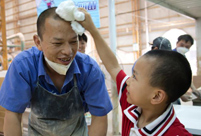With Guinean President Alpha Conde declaring a state of health emergency in the country, the four West African countries hit by the Ebola outbreak have called emergency in a war-like battle against the deadly epidemic.
However, Chinese companies that have projects in West Africa are not scared away by the Ebola outbreak but hold on to their commitment and win-win cooperation with African countries.
HOLDING GROUND WITH PREVENTIONS TAKEN FIRST
The 24th contingent of Chinese medics and the second team of Chinese public health experts have arrived in Conakry, the capital city of Guinea. The experts will give advises to the Chinese companies on how to take preventions against Ebola.
According to Counsellor Gao Tiefeng at the Chinese embassy, all Chinese companies in Guinea have upgraded prevention to ensure the health of their staffers. They have arranged shifts and vacation for their workers.
Zhang Jun, a project manager of China International Water and Electric Corporation (CWE) that was working on the largest water and electric project in Guinea so far, told Xinhua that the company wasted no time in setting up an emergency and aid center after the Ebola outbreak.
Even though CWE's project is located in a populated area in the capital, none of its several hundred Chinese workers and 1,500 local employees were infected, thanks to a quick response to the virus.
China Harbor Engineering Company also took preventive measures, such as sterilizing all offices and dorm rooms every week and control the flow of all personnel and vehicles in and out of the company's compound.
The branch of China's Huawei in Guinea guaranteed the normal operation of its service and technical support to its local contractors as Ebola killed more than 380 people in the country.
In Sierra Leone, which is in its rain season, many Chinese projects have been suspended and the Chinese companies cut off direct contact with outsiders as a precautious measure.
The Ebola outbreak in Liberia has affected the operation and business of Chinese companies in the country, but Chinese workers remain safe and the risk is still controllable, said a Chinese diplomat.
There are some 1,500 workers with Chinese companies in Liberia and the impact of the epidemic on Chinese companies has gradually surfaced, Chinese commercial counsellor Xiao Mingxiang told Xinhua on Friday.
Due to the withdrawal of the medical staff of international organizations and the heavy loss of local medics, the Liberian medical institutes have come to a crunch, Xiao said.
Thanks to the strict protective measures the Chinese companies have put in place, their employees face little threat from the Ebola virus, but such tropical diseases as malaria and typhoid pose potential risks, he said.
In Kenya, East Africa, dozens of projects were running as usual, without being affected by the Ebola fears.
CHINA-AFRICA TIES WEATHER WEAL, WOE
Liberian President Ellen Johnson-Sirleaf lauded the medical aid from China, which has just been hit by a devastating Yunnan earthquake, as a huge "inspiration" to the African country that has been mired in the Ebola outbreak since March.
The brotherly ties between China and Africa could be described by a famous Chinese saying -- A friend in need is a friend indeed.
China has offered in April then Ebola-affected African countries - Guinea, Liberia, Sierra Leone and Guinea-Bissau - with relief supplies worth one million RMB (162,000 U.S. dollars) respectively to combat the deadly virus.
These supplies, delivered to the African nations in May, were instrumental in fighting the disease.
Beijing upgraded its assistance to Guinea, Liberia and Sierra Leone as the situation escalated. China said on Aug. 7 that it will provide the three West African countries with emergency humanitarian aid.
The supplies, worth 30 million yuan (4.9 million U.S. dollars), included medical protective clothes, disinfectants, thermo-detectors and medicines.
UN Secretary-General Ban Ki-moon also applauded China's timely assistance to Africa and called on the international community to continue to help African countries fight the epidemic.4
The emergency aid of China, a country with rich experiences in controlling and preventing public health emergencies, such as the outbreak of SARS in 2003 and the H7N9 bird flu virus in recent years, is critical to combat the epidemic, said the World Health Organization (WHO).
Besides, despite the spiraling panic and widespread outflow of capitals among foreign investors in Guinea, Chinese companies' investment and operation are a staunch support to the country highly dependent on foreign investment, said Guinean financial analyst Aliou Bah.
The Chinese companies are confident about the African market, said Zhang Jun of the CWE. "Hydroelectricity is the fundamental business of my company in Africa. We believe China's advanced technology in this aspect can work in Africa and will contribute to its development."
Zhang Xiaoyu, head of the Hauwai branch in Guinea, also said that Huawei, contractor of Guinea's national broadband infrastructure project, will considerably promote the country's informatization.
"I believe that Guinea will witness rapid development after it weathers the current difficulty," he added.
From low-end products to high-end manufacturing, from traditional business to emerging industries, China and Africa have seen economic and trade cooperation upgraded and their interests increasingly intertwined.
Bilateral trade volume in 2013 reached 210.2 billion U.S. dollars, over 2,000 times that in 1960. China has been Africa's biggest trading partner for five years, and the latter China's second largest project contracting market and fourth investment destination.
China-Africa cooperation is seeing a burgeoning growth, as Africa's exports to China soars after the continent's steel, copper, chemical fertilizer and electronic products entered Chinese market in recent years.
In 2011, Africa's trade surplus to China reached 20.1 billion dollars. Over 2,500 Chinese companies have invested in Africa till now, creating more than 100,000 local jobs.
With intertwined destiny, morality and interests, China and Africa will see more reciprocal economic and trade cooperation in the future.
 Beautiful policewoman in an anti-terrorism SWAT team
Beautiful policewoman in an anti-terrorism SWAT team Cute photos of little Taoist nuns and monks go viral online
Cute photos of little Taoist nuns and monks go viral online Amphibious armored vehicle unit conducts open sea drill
Amphibious armored vehicle unit conducts open sea drill A post-90s girl who takes grandma to work
A post-90s girl who takes grandma to work Beijing policewomen posters become a hit
Beijing policewomen posters become a hit Armored regiment trains on the sea
Armored regiment trains on the sea Children spend 'Father's Day' with dads at work
Children spend 'Father's Day' with dads at work 'Pan Da' appear in Shanghai World Financial Center
'Pan Da' appear in Shanghai World Financial Center Champions take selfies on podium
Champions take selfies on podium The vanishing folk skills
The vanishing folk skills Intoxicating beauty of Dali, Yunnan province
Intoxicating beauty of Dali, Yunnan province Memorable moments of Ludian earthquake
Memorable moments of Ludian earthquake Bring world together to help elephant
Bring world together to help elephant 'Building Dreams'
'Building Dreams'  Labrang Monastery
Labrang MonasteryDay|Week|Month